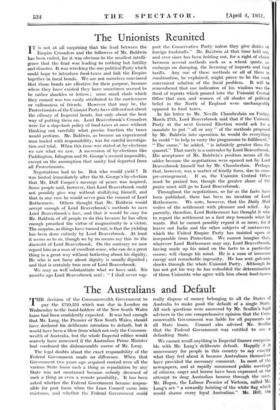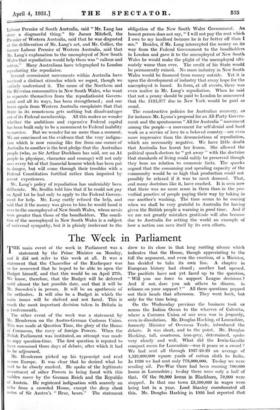The Australians and Default
THE decision of the Commonwealth Government to pay the £729,251 which was due in London on Wednesday to the bond-holders of the New South Wales loans had been confidently expected. It was bad enough that Mr. Lang, the Premier of New South Wales, should have declared his deliberate intention to default, but it would have been a blow from which not only the Common- wealth of Australia, but the whole Imperial edifice would scarcely have recovered if the Australian Prime Minister had condoned the dishonourable course of Mr. Lang.
The legal doubts about the exact responsibility of the Federal Government made no difference. When that Government two years ago acquired control over all the various State loans such a thing as repudiation by any State was not mentioned because nobody dreamed of such a thing as even a remote possibility. It has been asked whether the Federal Government became respon- sible for past loans when the Loan Council came into existence, and whether the Federal Government could really dispose of money belonging to all the States of Australia to make good the default of a single State. All such questions were answered by Mr. Sculln- legal advisers in the one comprehensive opinion that the Com- monwealth Government was liable for all payments on all State loans. Counsel also advised Mr. Scullin that the Federal Government was entitled to sue defaulting State.
We cannot recall anything in Imperial finance compara- ble with Mr. Lang's deliberate default. Happily it is unnecessary for people in this country to say exactly what they feel about it because Australians themselves have provided the necessary comment. In most of the newspapers, and at rapidly summoned public meetings of citizens, anger and horror have been expressed at the attempt to drag Australian honour through the mire. Mr. Hogan, the Labour Premier of Victoria, called Mr. Lang's act " a cowardly hoisting of the white flag which would shame every loyal Australian." Mr. Hill, the Labour Premier of South Australia, said " Mr. Lang has done a disgraceful thing." Sir James Mitchell, the Premier of Western Australia, said that he was disgusted at the deliberation of Mr. Lang's act, and Mr. Collier, the former Labour Premier of Western Australia, said that Mr. Lang's explanation to the unemployed of New South Wales that repudiation would help them was " callous and rotten." Many Australians-have telegraphed to London repudiating the repudiator.
Several secessionist movements within Australia have received a distinct stimulus which we regret, though we rntirely understand it. The cause of the Northern and the Riverina communities in. New South Wales, who want to separate themselves from the repudiationist Govern- ment and all its ways, has been strengthened ; and one hears again from Western Australia complaints that that State in its remoteness gets nothing but disadvantages out of its Federal membership. All this makes us wonder whether the ambitious and expensive Federal capital has been built only to be a monument to Federal inability to survive. But we wonder for no more than a moment. We are convinced on the evidence that the very indigna- tion which is now running like fire from one corner of Australia to another is the best pledge that the Australian people (who, as Sir Arthur Duckham has said, are an Al people in physique, character and courage) will not only save every bit of that financial honour which has been put in danger, but will come through their troubles with a Federal Constitution fortified rather than impaired by recent experiences.
Mr. Lang's policy of repudiation has undeniably been deliberate. Mr. Scullin told him that if he could not pay on April 1st he had only to apply to the Federal Govern- ment for help. Mr. Lang curtly refused the help, and said that if the money was given to him he would hand it over to the unemployed of New South Wales, whose needs were greater than those of the bondholders. The condi- tion of the unemployed in New South Wales is a subject of universal sympathy, but it is plainly irrelevant to the obligation of the New South Wales Government. An honest person does not say, " I will not pay the rent which I owe to my landlord because he is far better off than I am." Besides, if Mr. Lang intercepted the money on its way from the Federal Government to the bondholders in London and gave it to the unemployed of New South Wales he would make the plight of the unemployed ulti- mately worse than ever. The credit of his State would be permanently ruined. No more industry in New South Wales would be financed from money outside. Yet it is -upon the development of industry that every hope for the unemployed is based. In form, at all events, there was even malice in Mr. Lang's repudiation. When he said that not a penny should be paid to London he announced that the £125,377 due to New York would be paid as usual.
The constructive policies for Australian recovery, as for instance Mr. Lyons's proposal for an All-Party Govern- ment and the spontaneous "All for Australia " movement among the people—a movement for self-denial and hard work as a service of love to a beloved country—are even more impressive than the denunciations of repudiation, which are necessarily negative. We have little doubt that Australia has learnt her lesson. She allowed the political quack-doctors to " get away " with the doctrine that standards of living could safely be preserved though they bore no relation to economic facts. The quacks argued that the consuming and spending capacity of the community would be so high that production could not possibly be relaxed if it was to meet demand. That, and many doctrines like it, have crashed. It is seen now that there was no more sense in them than in the pro- verbial practice of people paying their way by taking in one another's washing. The time seems to be coming when we shall be very grateful to Australia for having given the British people a warning in good time. And if we are not greatly mistaken gratitude will also become due to Australia for setting the world an example of how a nation can save itself by its own efforts.









































 Previous page
Previous page